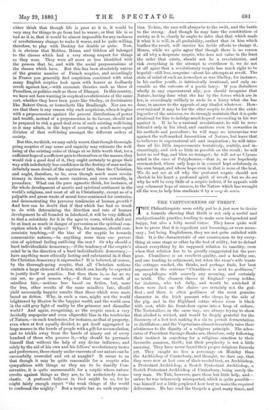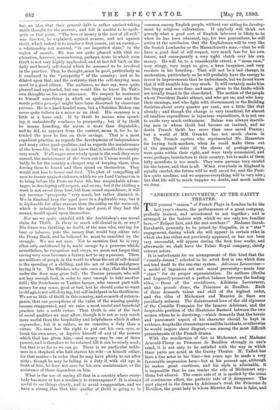THE VIRTUOUSNESS OF THRIFT.
THE Philanthropists seem oddly put to it just now to devise a formula showing that thrift is not only a useful and unobjectionable practice, tending to make men independent and happy, but also a lofty moral virtue. They know quite well how to prove that it is expedient and becoming, or even neces- sary; but being Englishmen, they are not quite satisfied with that. It is the characteristic of our countrymen to try every- thing at some stage or other by the test of utility, but to defend almost everything by its supposed relation to sanctity, even. when that relation has to be greatly exaggerated for the pur- pose. Cleanliness is an excellent quality, and a healthy one, and one tending to refinement, but when the vicar's wife wants the cottages washed, she thinks, and perhaps finds, her best argument in the sentence "Cleanliness is next to godliness," an apophthegm with scarcely any meaning, and certainly no truth. The cleanest classes in England—young nobles,. for instance, who tub daily, and would be wretched if there were dust on the chairs—are certainly not the god- liest ; and there is often godliness of the most genuine- character in the Irish peasant who sleeps by the side of the pig, and in the Highland cottar whose room is black with soot, while his front-door opens into a heap of ordure. The Teetotallers, in the same way, are always trying to show that alcohol is wicked, and would be deeply grateful for the discovery of a lost text making it a sin to permit fermentation or distillation ; and the Vegetarians almost invariably raise their abstinence to the dignity of a religious principle. The advo- cates of Provident Savings-Banks are, therefore, only following. their instinct in searching for a religious sanction to their favourite panacea, thrift ; but their perplexity is not a little amusing. They have never found their proper religious formula yet. They caught no less a personage on Monday than the Archbishop of Canterbury, and thought, we dare say, that they were now at last sure of their needed text, an Archbishop,. a Protestant Archbishop, a Scotch Protestant Archbishop, a Scotch Protestant Archbishop of Canterbury, being surely the very man. Dr. Tait, however, gave them but little help, and— unless he was infamously misreported, which is quite possible— was himself not a little perplexed how best to make the required deliverance. He has read the Gospels a good many times, and has an idea that their general drift is rather against taking much thought for the morrow, and felt it needful to be apolo getic on that point. "The love of money is the root of all evil,' was directed, he explained, against avarice, and not against thrift, which indeed is to avarice a first cousin, yet an enemy,— a relationship not unusual, "in our imperfect state," in the region of morals. He was not quite pleased with that ex- planation, however, remembering, perhaps, texts in which even thrift is not very highly applauded, and at last fell back on the daily and hourly self-denial which he assumed to be involved. in the practice. That, he thought, must be good, particularly as it conduced to the " prosperity " of the country ; and so he dilated upon that, and the certainty that the self-denying man must be a good citizen. The audience, we dare say, were quite pleased and applauded, but one would like to know Dr. Tait's own thoughts on his own utterance. We suspect he muttered to himself something in which an apologetic tone and the words pet itio principii might have been discerned by observant persons. He is a hard-headed man, but a Christian Bishop can never quite believe in a miser as an ideal. His economy is a little at a loose end. If by thrift he means wise spend- ing, it undoubtedly conduces to prosperity ; but if by thrift he means hoarding, the axiom is more than disputable; and he did, as appears from the context, mean it, for he in- tended the poor to live on their savings. That is a most expedient practice, as regards the development of independence and many other good qualities, and as regards the maintenance of the home-life, but we do not know that it benefits the country very much. If all wages were wisely spent in the week they were earned, the maintenance of the worn-out in Unions would pro- bably be for the country a cheaper way of keeping them, than forcing them to hoard and then spend on themselves. They would cost less to house and feed. The plan of compelling all men to insure against sickness, which we see Lord Carnarvon is to bring before the Peers on June 4th, has unspeakable advan- tages, in developing self-respect, and so on; but if the shilling a week is not saved from beer, but from sound expenditure, it will not increase " prosperity " very much, but rather diminish it. We in England keep the aged poor in a deplorable way, but it is deplorable for other reasons than the outlay on the worn-out, which is infinitely less than the aged poor, if they had the means, would spend upon themselves.
Nor are we quite satisfied with the Archbishop's one moral claim for Thrift. Is there so much self-denial in it, or any ? His Grace was thinking, no doubt, of the man who, craving for beer or tobacco, puts the money that would buy either into the Penny Bank, and he believed he must be ennobled by the struggle. We are not sure. Not to mention that he is very often only embittered by it, made savage by a pressure which, nevertheless, he recognises and obeys, we must not forget that saving very soon becomes a luxury, not to say a passion. There are millions of people in the world to whom the act of self-denial is the spending of a shilling, and the act of selfish indulgence laying it by. The Hindoo, who eats once a day, that the hoard under the floor may grow full ; the Tuscan peasant, who will not buy enough food, in order to save enough to take another field; the Scotchman or Yankee farmer, who cannot part with money for any cause, good or bad, lest he should come to want in old age, is not self-denying, but self-indulgent in his thriftiness. We see so little of thrift in this country, and so much of extrava- gance, that our perceptions of the value of the missing quality become exaggerated, and we raise a most useful and beneficial practice into a noble virtue. That thrift is one of the best of social qualities we may allow, though it is not so very much more useful than the hospitality and helpfulness which it often supersedes ; but it is rather, as we conceive, a duty than a virtue. No man has the right to put out his own eyes, or break his own arms, or deprive himself of any of the powers which God has given him,—and money may be one of those powers, and is therefore to be retained till it can be wisely used; but that is as far as we can go. There is no particular noble- ness in a shepherd who half-starves his wife—or himself either, for that matter—in order that he may have plenty to eat after sixty; though he may be failing in a duty if, with old age in front of him, he does not save for his own maintenance, or the assistance of those dependent on him.
What is the use of saying all that in a country where every- body has more or less a tendency to extravagance P It is always useful to see things clearly, and to avoid exaggeration, and we have a strong idea that this quality of thrift is going to be common among English people, without our aiding its develop- ment by religious exhortation. If anybody will think out gravely what a good sort of English labourer is likely to be when he has been educated, say, for two generations, he will arrive at the conclusion that the Englishman will be very like the Scotch Lowlander or the Massachusetts man,—that be will have a good deal of self-respect, very much fear for his own future, and consequently a very tight clutch over his own money. He will be, to a considerable extent, a "mean cuss," very stingy, very inapt to give, a keen bargainer, and very resolute in his hoarding. That will not be a bad change, in moderation, particularly as he will probably have the energy to invest in improvements that he understands, but we do not know that it will ennoble him very much. It will certainly make him. less happy and more dour, and more given to the faults which are usually found in the close-fisted. The section of the people whom Provident Banks attract, and who get on, and who keep their earnings, and who fight with Government or the Building Societies about every quarter per cent., are a little like that already ; and though the change is very beneficial, for almost all needless expenditure is injurious expenditure, it is not one to excite very much enthusiasm. Balzac was always describ- ing men in whom thrift had become an instinct, and no doubt French thrift has more than once saved France; but a world of MM. Grandet has not much charm in it. The French squires who reprimanded Mr. Hamerton for buying book-markers, when he could make them out of the gummed sides of the sheets of postage-stamps, were quite within their right, and were truly economical, and were, perhaps, benefactors to their country, but to make of them lofty moralists is too much. They were persons very careful for the future, 'and that is all. When everybody in England is equally careful, the future will be well cared for, and the Poor- law quite needless, and we suppose everything will be very nice ; but that life will be much happier we doubt, and much nobler we deny.



































 Previous page
Previous page